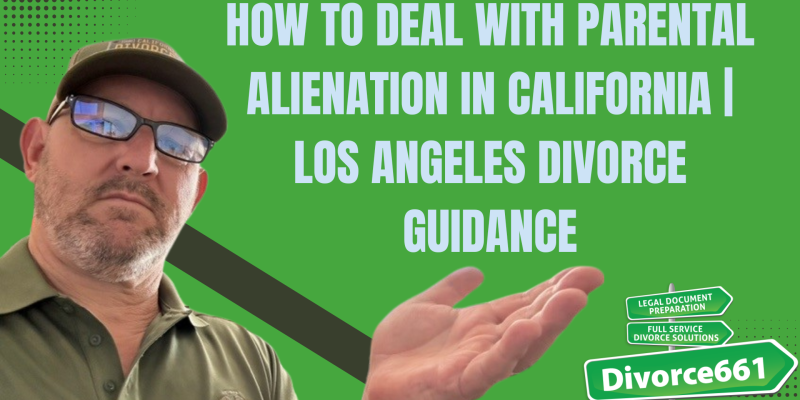How to Deal with Parental Alienation in California | Los Angeles Divorce Guidance
I’m Tim Blankenship with Divorce661. In this guide I walk you through what parental alienation looks like, why California courts take it seriously, and exactly what you should do to protect your relationship with your child. If you’re feeling like your child’s affection has been replaced by resentment, this article will give you practical steps you can take right away.
What Is Parental Alienation?
Parental alienation happens when one parent intentionally or repeatedly harms a child’s relationship with the other parent. It can be overt or subtle, and it often shows up during divorce or custody disputes.
- Common tactics: limiting contact, badmouthing the other parent, and manipulating a child’s emotions to turn them against the other parent.
- Why it matters: alienation damages a child’s relationship with both parents and can have long-term emotional consequences.
How Parental Alienation Shows Up
Watch for behaviors that may seem small on their own but add up over time. These include:
- Blocked calls or texts from the other parent.
- Refusal to allow scheduled visits or sudden cancellations without good reason.
- Negative comments or false stories about the other parent that a child repeats.
- Subtle emotional manipulation—suggesting the child choose sides or implying the other parent doesn’t care.
“Be vigilant for signs like blocked calls, refusal of visits, or negative comments from your child.”
Why California Courts Take Parental Alienation Seriously
California family courts prioritize the child’s best interest. That means judges are focused on preserving healthy parent-child relationships whenever possible. When alienation is documented and proven, courts will consider modifications to custody and visitation to protect the child’s welfare and restore a meaningful relationship with the alienated parent.
Document Everything: Your Most Important Step
Documentation is the backbone of any successful court case involving parental alienation. The more specific and organized your records, the stronger your position will be in court.
- Keep a contemporaneous log with dates, times, and descriptions of each incident (missed visits, blocked calls, what the child said, who was present).
- Save communications—texts, emails, voicemail messages, social media posts—and take screenshots when necessary.
- Obtain supporting statements from witnesses: teachers, therapists, other relatives, or babysitters who observed concerning behavior.
- Keep records of attempts to resolve issues amicably (requests for makeup visits, proposed parenting plan changes).
- Include professional records when applicable—therapist notes, school reports, or other documentation that demonstrates the child’s changing attitude or emotional state.
“Document every detail related to alienation, including dates, times, and specific incidents.”
Legal Options: Modifying Custody and Enforcing Visitation
If documentation shows a pattern of alienating behavior, you can ask the court to modify custody or enforce visitation. Typical legal steps include:
- Filing a request to modify the parenting plan or custody order.
- Requesting court-ordered make-up visitation or changes to the parenting schedule to ensure meaningful contact.
- Asking the court for sanctions or remedies when one parent violates existing orders.
- Presenting compiled evidence and witness testimony to demonstrate the alienation pattern.
Every case is different, so legal guidance is critical. An attorney or legal team experienced in custody and visitation disputes will help you build a strategy based on the evidence you’ve collected.
A Real Client Example
We worked with a parent whose ex blocked calls and refused visits. By documenting every violation and presenting that evidence to the court, the judge adjusted the parenting plan and restored the parent’s visitation rights. That change protected the parent-child bond and ensured the child continued to have a healthy relationship with both parents.
Practical Tips While You Navigate the Process
- Stay calm and keep interactions focused on the child’s needs—avoid retaliatory behavior that could be used against you.
- Communicate in writing when possible so you have records (courteous, brief, and child-centered).
- Seek therapy or counseling for the child and for yourself—professional notes can support your case and help with the child’s emotional recovery.
- Educate yourself about California family law and the local court’s expectations; being informed makes you a stronger advocate.
How Divorce661 Can Help
At Divorce661 we provide step-by-step support for custody and visitation issues across California. Our services include:
- Guidance on documentation and court strategy.
- Flat-fee divorce and custody services to reduce uncertainty about legal costs.
- Practical help modifying custody orders or enforcing visitation when parental alienation is present.
If you believe your child is being turned against you, take action sooner rather than later. Protecting your parental rights and restoring your relationship with your child starts with documenting events and getting the right legal and professional help.
Conclusion
Parental alienation is damaging—and California courts will consider evidence of it because the child’s best interest comes first. Be vigilant, document everything, seek professional support, and work with experienced legal counsel to restore and safeguard your relationship with your child.
Need help? Visit Divorce661.com for a free consultation and learn how we can help protect your rights and your relationship with your child.

